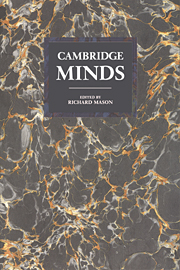Book contents
- Frontmatter
- Contents
- Notes on contributors
- Preface
- 1 The effects of a broken home: Bertrand Russell and Cambridge
- 2 I. A. Richards, F. R. Leavis and Cambridge English
- 3 Emily Davies, the Sidgwicks and the education of women in Cambridge
- 4 Radioastronomy in Cambridge
- 5 Three Cambridge prehistorians
- 6 John Maynard Keynes
- 7 Mathematics in Cambridge and beyond
- 8 James Stuart: engineering, philanthropy and radical politics
- 9 The Darwins in Cambridge
- 10 How the Burgess Shale came to Cambridge; and what happened
- 11 Ludwig Wittgenstein
- 12 ‘Brains in their fingertips’: physics at the Cavendish Laboratory 1880–1940
- 13 J. N. Figgis and the history of political thought in Cambridge
- 14 Molecular biology in Cambridge
- 15 James Frazer and Cambridge anthropology
- 16 Michael Oakeshott
1 - The effects of a broken home: Bertrand Russell and Cambridge
Published online by Cambridge University Press: 21 October 2009
- Frontmatter
- Contents
- Notes on contributors
- Preface
- 1 The effects of a broken home: Bertrand Russell and Cambridge
- 2 I. A. Richards, F. R. Leavis and Cambridge English
- 3 Emily Davies, the Sidgwicks and the education of women in Cambridge
- 4 Radioastronomy in Cambridge
- 5 Three Cambridge prehistorians
- 6 John Maynard Keynes
- 7 Mathematics in Cambridge and beyond
- 8 James Stuart: engineering, philanthropy and radical politics
- 9 The Darwins in Cambridge
- 10 How the Burgess Shale came to Cambridge; and what happened
- 11 Ludwig Wittgenstein
- 12 ‘Brains in their fingertips’: physics at the Cavendish Laboratory 1880–1940
- 13 J. N. Figgis and the history of political thought in Cambridge
- 14 Molecular biology in Cambridge
- 15 James Frazer and Cambridge anthropology
- 16 Michael Oakeshott
Summary
Bertrand Russell once described Cambridge as: ‘the only place on earth that I could regard as home’. It is a remark that says as much about his attitude to his family home as it does about his attitude to Cambridge, but it also indicates something of the kind of relationship he had with Cambridge. Like that of a prodigal son to his family, it was occasionally stormy and difficult but ultimately supportive.
His first experience of Cambridge was in December 1889, when he came to Trinity to sit a scholarship exam. On that occasion, it has to be said, he felt anything but at home. He stayed in rooms in New Court and was so shy that he did not dare to ask directions to a lavatory. And so, every morning before his exam, he walked to the railway station to use the public lavatory there.
Having won his scholarship, Russell went up to Trinity in October 1890. From that moment, he writes in his Autobiography, ‘everything went well with me’. The discovery, he says, ‘that I could say things that I thought, and be answered with neither horror nor derision, but as if I had said something quite sensible, was intoxication’.
It was perhaps the first instance in Russell's life in which he made some sort of breakthrough from the intense loneliness that had characterised the first years of his life.
- Type
- Chapter
- Information
- Cambridge Minds , pp. 1 - 19Publisher: Cambridge University PressPrint publication year: 1994

